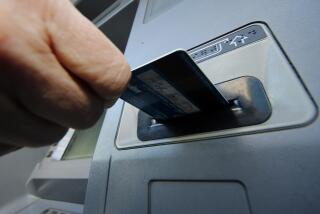Federal Credit Unions Offer Safety, Great Deals
- Share via
Savers unhappy about rates and loan terms at thrifts and banks may consider shifting to credit unions. If you are among these switchers, it might help to know the safety of credit unions, and how you can make sure yours is not on the financial sick list.
Credit unions certainly are gaining in popularity these days. Their deposits--called shares--grew by an annual rate of about 8% in the first half of this year, up from about 7% for all of last year, according to Kenneth Robinson, chief executive of the National Assn. of Federal Credit Unions, a trade group. By contrast, the nation’s savings and loans have been losing deposits steadily this year.
Some of this credit union growth may be due to savers’ apprehensions in the wake of massive thrift failures and worries that similar woes may beset banks. Some of it is also due to growth of existing deposits through interest accrual.
But some of the gain is due to some credit unions’ great deals. Because they are cooperatives owned (and often managed) by their members, they don’t have the same profit motive as banks and thrifts. Accordingly, they often pay more on deposits than banks and thrifts and provide more favorable terms on auto and other loans. Also, credit unions are adding convenient services, such as checking accounts, credit cards and access to automated teller machines.
But are credit unions as safe as thrifts and banks?
Generally, yes. Five out of six credit unions have federal deposit insurance that is virtually identical to that of banks and thrifts, says Warren G. Heller, research director for Veribanc, a firm that rates the safety of savings institutions. The $2.1-billion National Credit Union Share Insurance Fund is administered by the National Credit Union Administration, a federal agency similar to the Federal Deposit Insurance Corp., which insures banks and thrifts.
Federal credit union deposit insurance is backed by the full faith and credit of the U.S. government, just like that of the FDIC. The rules are basically the same as for banks and thrifts, with deposits insured up to $100,000. So if your credit union fails, and your deposits are fully insured, don’t worry--you won’t lose your money.
Further, some argue that the federal credit union insurance fund is better capitalized than the FDIC’s fund. It has $1.28 for every $100 it insures, versus 70 cents for every $100 at the FDIC.
All of the nation’s 8,900 federally chartered credit unions and many state chartered ones are federally insured, although some state chartered ones carry state or private insurance. Some state chartered institutions are not insured at all.
What about financial strength? Federally insured credit unions’ average capital-to-asset ratios (a common measure of how much money they have in reserve as a cushion against loan losses) is about 7.4%, compared to 6.3% for banks and 2.1% for thrifts, Veribanc’s Heller says.
Failures? They are a growing problem, but no more so than for banks, Heller says. Some 85 credit unions failed last year, with 35 being closed and 50 being merged into other credit unions with federal assistance, according to Robinson.
Lending policies? Banks--which are concerned about the competition posed by credit unions--say credit union lending is getting riskier as some institutions grow.
That may be true for some credit unions, although most can’t or won’t make many of the loans that got some thrifts and banks into trouble. Their primary lending is to their members, much of it in the form of auto loans and other small consumer loans. Federally chartered credit unions cannot or will not make many types of commercial real estate and business loans.
And they can invest only in securities or certificates of deposit that are government-backed or insured, such as CDs of federally insured savings institutions, Treasury securities or mortgage securities backed by such agencies as the Government National Mortgage Assn. Junk bonds, stocks or futures are not allowed.
Nonetheless, bad loans can be a problem, particularly if the economy sours and more consumers default. “If consumers as a whole get into trouble, then we’ll see credit unions follow,” Heller says.
Further, many credit unions are small and lack a big cushion to sustain huge losses, he adds. Another risk: financial problems at the company, membership organization or other affinity group sponsoring the credit union.
What steps can you take to help you sleep better at night?
For absolute safety, make sure that your credit union deposits are federally insured. State or private insurance funds might be just as well capitalized as the federal fund. But they don’t have Uncle Sam’s rock-solid guarantee, and some states have reneged on insurance payoffs, Heller says.
Check on the credit union’s financial condition. Each is required to maintain for its members its balance sheet and profit-and-loss statement. Make sure that its capital-to-asset ratio is at least 6%, Patrick Keefe of the National Assn. of Federal Credit Unions suggests. Also, see that the credit union is profitable and that it doesn’t have a high ratio of bad loans, Heller says.
If financial statements make your head spin, some services rate credit unions. Veribanc, for example, rates the financial strength of all federally insured credit unions (as well as banks and thrifts).
It will provide an instant rating over the phone for a fee of $10 for the first institution and $3 for each additional one. It also provides detailed financial reports for additional charges. For information, call (800) 44BANKS or write Box 461, Wakefield, Mass. 01880.
More to Read
Inside the business of entertainment
The Wide Shot brings you news, analysis and insights on everything from streaming wars to production — and what it all means for the future.
You may occasionally receive promotional content from the Los Angeles Times.










